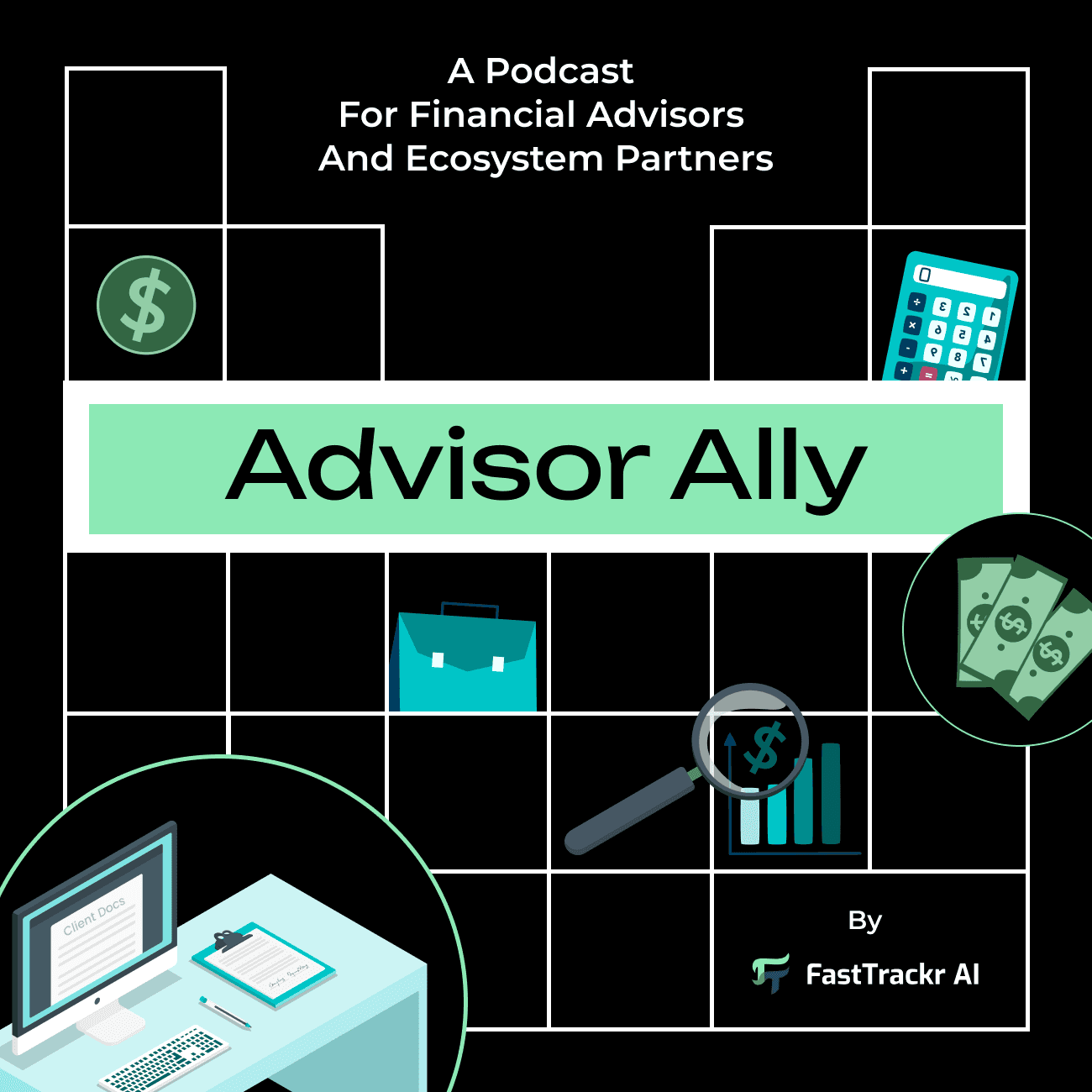Aug 14, 2025
The Journalist Every Financial Advisor Reads | Oisin Breen & Vineet Mohan | Advisor Ally Podcast 09
In this episode of Advisor Ally, we've with us Oisín Breen, an award-winning Irish journalist, poet, systems thinker, and academic who's spent nearly a decade dissecting the Registered Investment Advisor (RIA) space for RIABiz.
From his unusual path (horse-riding in the Irish countryside, FX analyst gigs, and late-blooming academia) to his penetrating critiques of wealth management, media narratives, and artificial intelligence, Breen offers a rare, multidimensional perspective. He’s not just watching the RIA world evolve: he’s documenting its soul, its cycles, and its contradictions.
The Journalist's Eye: Seeing Beyond the Surface
What happens when you approach wealth management not as an insider selling services, but as an outside observer connecting dots across the entire ecosystem? You start to notice patterns that others miss. You see the cyclical nature of industry trends, the gap between marketing messaging and client reality, and most importantly, the profound impact of storytelling on business outcomes.
The most successful advisors share a particular skill set that transcends traditional financial expertise: they're exceptional at investigation, persistence, and lateral thinking. They ask the right questions, dig deeper than surface-level client presentations, and connect seemingly unrelated pieces of information to create compelling narratives that resonate with their ideal clients.
The Cycle of Innovation: Why Best-of-Breed vs. All-in-One Never Ends
One of the most fascinating aspects of observing the wealth management technology landscape is witnessing the perpetual pendulum swing between integration and specialization. Three years ago, the consensus was clear: consolidated platforms were the future, and best-of-breed solutions were dead. Today, we're swinging back toward specialized tools and custom integrations.
Why does this cycle persist? Because both approaches have fundamental flaws, and the tension between them drives innovation forward.
The All-in-One Challenge:
Slower implementation
Feature bloat and complexity
Integration challenges when acquiring other companies
Legacy system issues (ask anyone who's worked with major banks about their 20-year-old infrastructure)
The Best-of-Breed Challenge:
Complex integration requirements
Need for sophisticated technology oversight
Higher due diligence requirements
Potential compatibility issues
The key insight? Stop viewing this as a binary problem. The most successful advisory firms embrace this tension as a creative force, using it to drive thoughtful technology decisions that serve their specific client base and business model.
The AI Reality Check: Beyond the Hype Cycle
Every new technology follows a predictable pattern: breathless excitement, widespread adoption attempts, inevitable disappointments, and finally, mature, realistic applications. We're currently watching this play out with AI in wealth management.
The current AI implementation reminds us of Italy discovering tomatoes—suddenly everyone wanted to put them in everything, regardless of whether it made culinary sense. Similarly, today's AI applications in wealth management often feel forced rather than purposeful.
The Current State:
Many advisors report AI tools initially speed up work but create additional cleanup time
Compliance risks from AI-generated content (lawyers using non-existent case citations in court)
Sloppy outputs that require as much time to fix as original creation
The Future Promise: AI's real value lies not in replacing human judgment but in enhancing analytical capabilities at scale. Think back-end data analysis, pattern recognition across large client portfolios, and sophisticated risk modeling, not client-facing content generation or investment recommendations.
The most effective AI implementations in wealth management will function as powerful probabilistic analysis engines, not as replacements for advisor expertise and client relationship skills.
The Storytelling Imperative: Why Narrative Separates Great Advisors
Here's where most advisory marketing goes wrong: it focuses on features instead of stories, jargon instead of clarity, and generic messaging instead of authentic expertise.
The Pub Test: Before publishing any content or client communication, ask yourself: "If someone told me this in a pub, would I actually want to hear it?" If the answer is no, you're probably creating noise, not value.
The Grandmother Test: Can you explain your value proposition to your grandmother without using industry jargon? If you can't translate complex financial concepts into plain English, you're limiting your ability to connect with clients who need your expertise most.
The Word Choice Test: If you can replace any word in your marketing copy with another word without changing the meaning, those words are meaningless. "Streamlined," "seamless," and "cutting-edge" have become semantic white noise. Your expertise deserves more precise language.
The Human Connection: Why Relationship Skills Trump Technology
The most successful advisors understand something fundamental: clients hire people, not platforms. They want someone who remembers their children's names, understands their family dynamics, and genuinely cares about their long-term success.
This human element becomes even more critical as technology advances. While AI can analyze portfolios and generate reports, it cannot:
Build trust through authentic conversation
Navigate complex family dynamics
Provide emotional support during market volatility
Understand the personal stories behind financial decisions
The advisors who thrive in the next decade will be those who leverage technology to enhance their human capabilities, not replace them.
The Complexity Paradox: When Simple Isn't Better
Here's a common misconception in advisory marketing: that everything needs to be "simple." But simplicity and clarity aren't the same thing.
If you're an expert, and as a financial advisor, you are an expert, sometimes the right approach is to lean into your expertise rather than dumb it down. The key is translating complex concepts into plain English without losing their sophistication.
Your clients don't need you to be simple; they need you to be clear. They're hiring you precisely because their financial situation is complex and they lack the expertise to navigate it alone.
The Long Game: Building Sustainable Differentiation
In an increasingly crowded marketplace, sustainable differentiation comes from three sources:
Genuine Expertise: Deep, specialized knowledge that can't be easily replicated
Authentic Relationships: Real connections built on trust and understanding
Compelling Narrative: The ability to communicate your value in ways that resonate
The advisors who succeed long-term don't chase every new trend or technology. Instead, they develop a clear understanding of their ideal clients, build genuine expertise in serving those clients, and tell compelling stories about the transformation they enable.
The Investigation Advantage: Thinking Like a Journalist
The best advisors share certain characteristics with investigative journalists: they're naturally curious, extraordinarily persistent, and skilled at connecting disparate pieces of information to create meaningful insights.
This investigative mindset serves advisors well in:
Client Discovery: Going beyond surface-level financial data to understand true motivations and concerns
Market Analysis: Identifying trends and opportunities others miss
Problem Solving: Finding creative solutions to complex financial challenges
Relationship Building: Demonstrating genuine interest in clients' complete stories
Looking Forward: The Evolution of Advisory Excellence
The wealth management industry will continue evolving, with new technologies, regulations, and market conditions creating fresh challenges and opportunities. The advisors who thrive will be those who maintain focus on the fundamentals while thoughtfully incorporating innovations that serve their clients better.
Key principles for future success:
Embrace Useful Technology: Adopt tools that genuinely improve client outcomes, not just marketing messages
Maintain Human Focus: Remember that relationships, not algorithms, drive advisory success
Develop Narrative Skills: Invest in your ability to tell compelling, authentic stories about your value
Stay Intellectually Curious: Approach your practice with the mindset of a lifelong learner and investigator
The Takeaway: Stories, Systems, and Success
The future of wealth management belongs to advisors who understand that success requires mastery of three elements: compelling storytelling, thoughtful technology adoption, and genuine human connection. These aren't separate skills, they're interconnected capabilities that reinforce each other when properly developed.
The most successful advisors don't just manage wealth; they craft narratives that help clients understand their financial journey, leverage technology that enhances rather than replaces human judgment, and build relationships based on authentic expertise and genuine care.
In a world of increasing automation and commoditization, the advisors who master the art of strategic storytelling, who can connect dots, communicate clearly, and create compelling narratives around their clients' financial futures, will find themselves not just surviving, but thriving.
The question isn't whether storytelling matters in wealth management. The question is: what story are you telling, and is it worth listening to?
This article is based on insights from the Advisor Ally podcast by FastTrackr AI, where industry experts share their perspectives on the evolving world of wealth management and financial advisory services.







